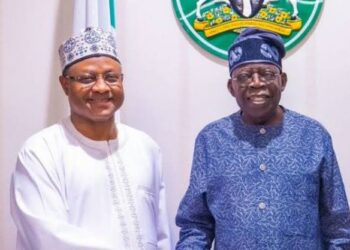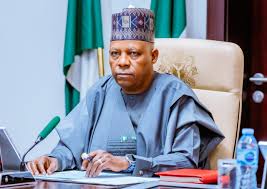Displeased with the pace of the case before the judge, the plaintiff had filed an ex parte application asking for the transfer of the issues of law in the case to the Court of Appeal for speedy determination.
A lawyer, Johnmary Jideobi, has appealed against the decision of the Federal High Court in Abuja dismissing his application for speedy hearing of his suit seeking the reinstatement of Rivers State Governor Siminalayi Fubara and other elected officials of the state.
President Bola Tinubu suspended Mr Fubara, his deputy and the state’s legislature under the state of emergency rule he imposed on the state on 18 March.
Mr Jideobi, in the substantive suit, sought an order reinstating the elected officials.
Displeased with the pace of the case before trial judge James Omotosho, the lawyer filed an ex parte application asking for the transfer of the issues of law in the case to the Court of Appeal for speedy determination.
However, Mr Omotosho dismissed the ex-parte application in a ruling on July 17.
The judge ruled that the application was only unmeritorious, it was also incompetent and breached the right to fair hearing of other parties to the suit.
Other parties joined as respondents in the suit are President Tinubu, the Attorney-General of the Federation (AGF), the Sole Administrator of Rivers State, Ibok-Ete Ibas, a retired vice admiral , and the Attorney-General of Rivers State.
In his notice appeal challenging the Federal High Court’s decision, Mr Jideobi sought an order “directing the lower trial High Court to send, forthwith, the constitutional reference which the appellant requested (by his ex-parte application) to the Court of Appeal.”
He further applied for “an order directing the Chief Judge of the Federal High Court to re-assign this suit to another judge of the Federal High Court than Honourable Justice J.K. Omotosho for an accelerated hearing.”
The lawyer, who anchored his ex-parte on section 295 (2) of the Nigerian constitution, maintained that the trial judge erred in law and refused to follow the decision of the Supreme Court when he held that the question of law in issue in the case was not one that could not be determined by the Federal High Court.
Mr Jideobi argued that section 295(2) of the Nigerian constitution permitted cases to be referred to the Court of Appeal under two conditions: the court could suo motu (on its own) take such a decision, and a party to the legal action could make such a request.
He wrote, “Under the first limb [when the court makes the reference, the court ‘may’ refer a constitutional question to the appellate court if it is of the opinion that the question involves a substantial question of law whereas under the second limb [when a party makes a request for the constitutional reference], the court (obligatorily) shall refer the question to the Court of Appeal if any party to the proceedings so requests.
“The Supreme Court, in its judgements after judgements, has remained insistent in holding that while the trial High Court is not under a duty to, suo motu, refer a constitutional question to the Court of Appeal, the trial High Court is however duty bound to [willy-nilly] make the said constitutional reference where either party to the proceedings so requests.”
The plaintiff had, in his substantive suit, prayed the trial court to declare that “the purported suspension of the Governor and the Deputy Governor of Rivers State of Nigeria by President Tinubu on 18 March as unconstitutional, null and void and of no legal effect whatsoever.
Although the lawyer had, earlier, joined Attorneys-General of all the 36 states of the federation in the suit, they were subsequently delisted by the appellant.
Meanwhile, no date has been fixed for the hearing of the appeal.









